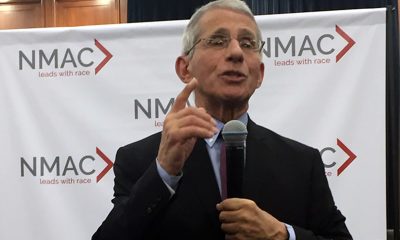District of Columbia
D.C. Council considers LGBTQ Pride license plates
Similar bill died in committee in 2022
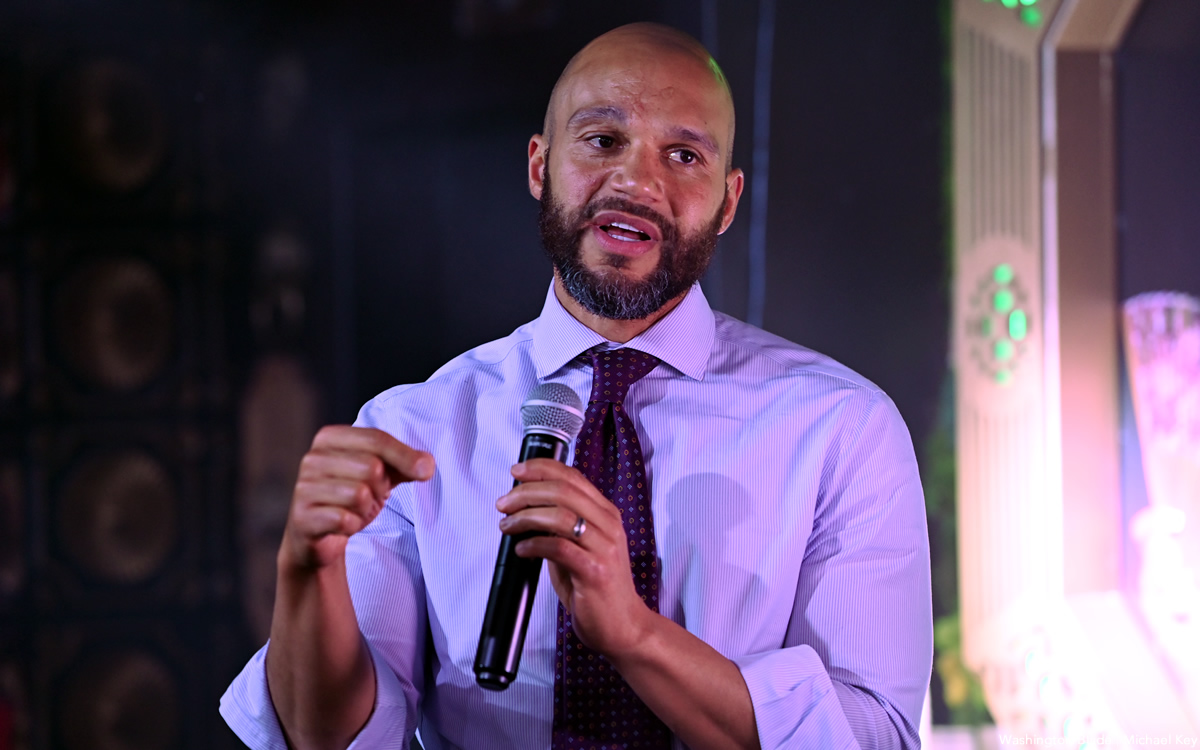
D.C. Councilmember Robert White (D-At-Large) reintroduced a bill this week calling for the creation of “LGBTQ Pride” license plates for motor vehicles licensed in the city for a small annual fee that will help fund the city’s Office of LGBTQ Affairs.
Eight other Council members joined White as co-introducers of the bill, indicating it has at least nine members of the 13-member Council as supporters of the bill.
The legislation, called the Pride Plates Amendment Act of 2023, states that, “The Mayor shall design and make available for issue one or more LGBTQ Pride motor vehicle tags demonstrating support for the LGBTQ community.”
The bill calls for amending the existing law that created the Mayor’s Office of Lesbian, Gay, Bisexual, Transgender and Questioning Affairs to create an Office of LGBTQ Affairs Fund. The revenue received by the D.C. Department of Motor Vehicles from a fee to be charged for the LGBTQ Pride tags will be deposited into the newly created Office of LGBTQ Affairs Fund, according to the bill.
“Money in the Fund shall be used by the Office to support programs that promote the welfare of the lesbian, gay, bisexual, transgender, and questioning community,” the bill states.
“A resident ordering an LGBTQ Pride tag shall pay a one-time application fee and a display fee each year thereafter,” the bill declares. “The application fee shall be $25, and the display fee shall be $20, or such other amount that may be established by the Mayor by rule,” the bill says.
The LGBTQ Affairs Office, among other things, awards grants to community based organizations that provide services to the LGBTQ community, including groups that provide support for homeless LGBTQ youth. Japer Bowles, a longtime local LGBTQ rights advocate, is the current director of the office.
Although the office is funded through the city’s annual budget, the revenue generated by the fees for the proposed Pride license plates is expected to strengthen its ability to support local LGBTQ related programs and services.
In a development that most LGBTQ activists were unaware of, White introduced a similar bill last year, but it appears to have died in the Council’s Committee on Transportation & The Environment, which never took a vote to release the bill to the full Council.
The committee at the time was chaired by Councilmember Mary Cheh (D-Ward 3) who chose not to run for re-election last year and is no longer on the Council. At a public hearing on the bill last July, Cheh expressed concern that an LGBTQ Pride license plate could be interpreted by a court to be a political message that would require the city to approve other political messages on license plates such as opposition to abortion.
Council records show that the bill last year had also been sent to the Council’s Committee on Government Operations and Facilities, which was chaired by Robert White. In a Sept. 22, 2022 report announcing its approval of the bill, the committee disputed Cheh’s suggestion that the political nature of a license plate supportive of the LGBTQ community could result in the city being forced to release license plates with political views opposing abortion or other views at odds with the city’s progressive positions.
“The committee does not share this concern,” the committee report says. “Under longstanding U.S. Supreme Court precedent, governments are allowed to decide the content of their own speech,” the report states.
Cheh, who is a professor at George Washington University Law School, could not immediately be reached for comment.
The Committee on Transportation & The Environment, where the newly introduced bill was sent this week, is currently chaired by Councilmember Charles Allen (D-Ward 6), who is one of the co-introducers of White’s bill.
A statement released by White’s office on Wednesday points out that the city’s Department of Motor Vehicles currently offers a wide variety of other specialty license plates expressing support for causes such as veterans with disabilities, breast cancer awareness, bicycle safety, protection for the Anacostia River, and opposition to taxation of D.C. residents without congressional representation.
“The District’s LGBTQ community is incredibly vibrant and active across our city,” White says in the statement released by his office. “Unfortunately, LGBTQ people around the country are being persecuted,” he says in the statement. “This bill reaffirms the District’s dedication to our LGBTQ residents and visitors, and also gives drivers an opportunity to make a difference with small but meaningful recurring contributions to OLGBTQA” [the Office of LGBTQ Affairs].
White added in the statement that he is excited that D.C. could have its Pride plates when the city hosts World Pride 2025, the international LGBTQ Pride event.
The other Council members who signed on as co-introducers of the bill include Zachary Parker (D-Ward 5), the Council’s only openly gay member; Charles Allen (D-Ward 6), Vincent Gray (D-Ward 7), Brooke Pinto (D-Ward 2), Janeese Lewis George (D-Ward 4) Christina Henderson (I-At-Large), Kenyan McDuffie (I-At-Large), and Matthew Frumin (D-Ward 3).
District of Columbia
Opening of Pride exhibition at Smithsonian’s African art museum postponed until 2026
Exhibition initially planned to open before WorldPride
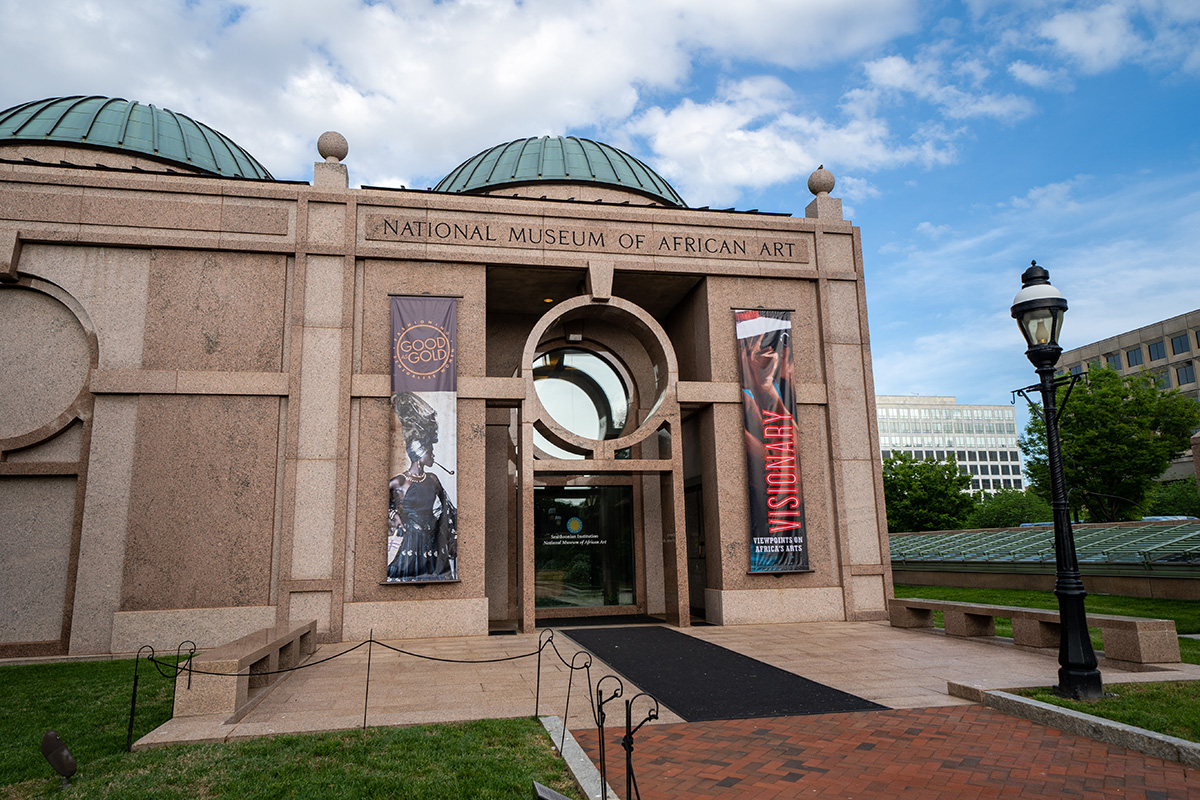
An exhibition of the works of art from LGBTQ African artists at the Smithsonian Institution’s National Museum of African Art was abruptly postponed due to “our current budgetary situation,” a museum spokesperson told the Washington Post.
The exhibition is entitled, “Here: Pride and Belonging in African Art.”
The Post, which broke the story about LGBTQ exhibition’s postponement on May 6, reports that the museum denied that the postponement was brought about by the Trump-Vance administration’s executive order restricting certain content at Smithsonian museums or the current political climate.
“This exhibition was on a very ambitious schedule to meet WorldPride, and we did not have enough time to secure all the private sector funds we had hoped to due to shifts in the fundraising environment,” the Post quoted Smithsonian spokesperson Jennifer Mitchell as saying.
Mitchell was referring to plans to open the exhibition in late May to coincide with the WorldPride events, which are scheduled to take place in D.C. from May 17-June 6.
The Post reports that the exhibition is now expected to open in February 2026 and to close at its originally scheduled closing time in August 2026.
The National Museum of African Art’s website describes the LGBTQ exhibition as consisting of “artists across Africa and the diaspora whose artworks connect to their identities and experiences as LGBTQ+ people.” It says those people are “featured as the first continental and diasporic survey of its scale and scope outside of Africa.”
The website statement adds, “The show assembles artists whose work has implicitly or explicitly challenged local and global legacies of homophobia and bigotry, offering images of alternative futures as well as celebrations of intimacy, faith, family, and joy.”
The Post reported that Mitchell “declined to say whether donors had withdrawn their support, explaining that she could not comment on private donors relations.”
Sources familiar with the Smithsonian have pointed out that private donors, including corporations, are the main source of funding for specific Smithsonian exhibitions. The federal government, with funds approved by Congress, traditionally has covered costs supporting the museum buildings, infrastructure, and upkeep.
District of Columbia
Bet Mishpachah to honor Fauci with lifetime achievement award
As part of its 50th anniversary celebration, Bet Mishpachah will present the Harvey Milk Chesed Award to Dr. Anthony S. Fauci in recognition of his groundbreaking leadership in infectious disease research and decades of service to global public health.
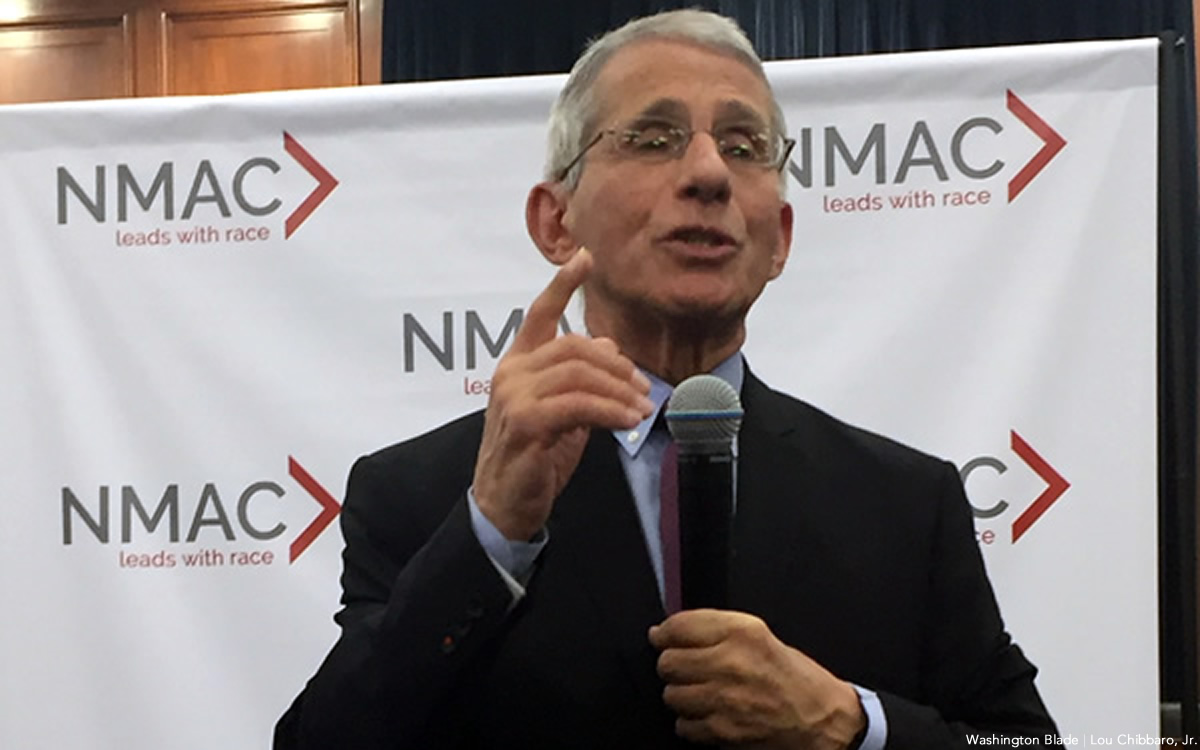
Bet Mishpachah, Washington’s LGBTQ synagogue, on Wednesday will honor former National Institute of Allergy and Infectious Diseases Director Dr. Anthony Fauci with an award for his lifelong devotion to public health and service.
Dr. Fauci will receive the Harvey Milk Chesed Award on May 7 at 7 p.m. in Cafritz Hall at the Edlavitch Jewish Community Center of Washington, D.C., at 1529 16th Street, N.W.
The award is given annually to someone who has made “outstanding” contributions to the LGBTQ+ and Jewish communities that “exemplify the virtue of chesed, or ‘lovingkindness.’” Fauci’s commitment to combating infectious diseases-HIV/AIDS, respiratory infections, diarrheal diseases, tuberculosis, malaria, Ebola, Zika, and COVID-19-as well as his leadership in public health policy, embodies this value, according to Bet Mishpachah President Joseph Pomper.
“Bet Mishpachah is honored to have this opportunity to recognize Dr. Fauci for his lifelong commitment to the health and well-being of millions of people around the world,” said Pomper. “As members of the LGBTQ+ community, we are especially thankful for his courage and dedication in the fight against HIV/AIDS. He stood with us at a time when our community was often shunned and stigmatized. Today, as members of our community are again under attack, his leadership in that crisis and throughout his career serves as a shining example of the spirit of chesed (lovingkindness) that we honor with this award.”
Following the presentation, Fauci will join his longtime friend and colleague Jeff Levi — emeritus professor at the Milken Institute School of Public Health at George Washington University and former deputy director of the White House Office of National AIDS Policy — for a conversation.
Fauci advised seven presidents on key health issues, most prominently HIV/AIDS, and helped create the President’s Emergency Plan for AIDS Relief (PEPFAR), which has saved more than 20 million lives globally.
The event is part of Bet Mishpachah’s 50th anniversary celebration. Registration is closed, but waitlist requests can be sent to [email protected].
District of Columbia
WorldPride permits for National Mall have yet to be approved
Organizers say application process is going according to plans
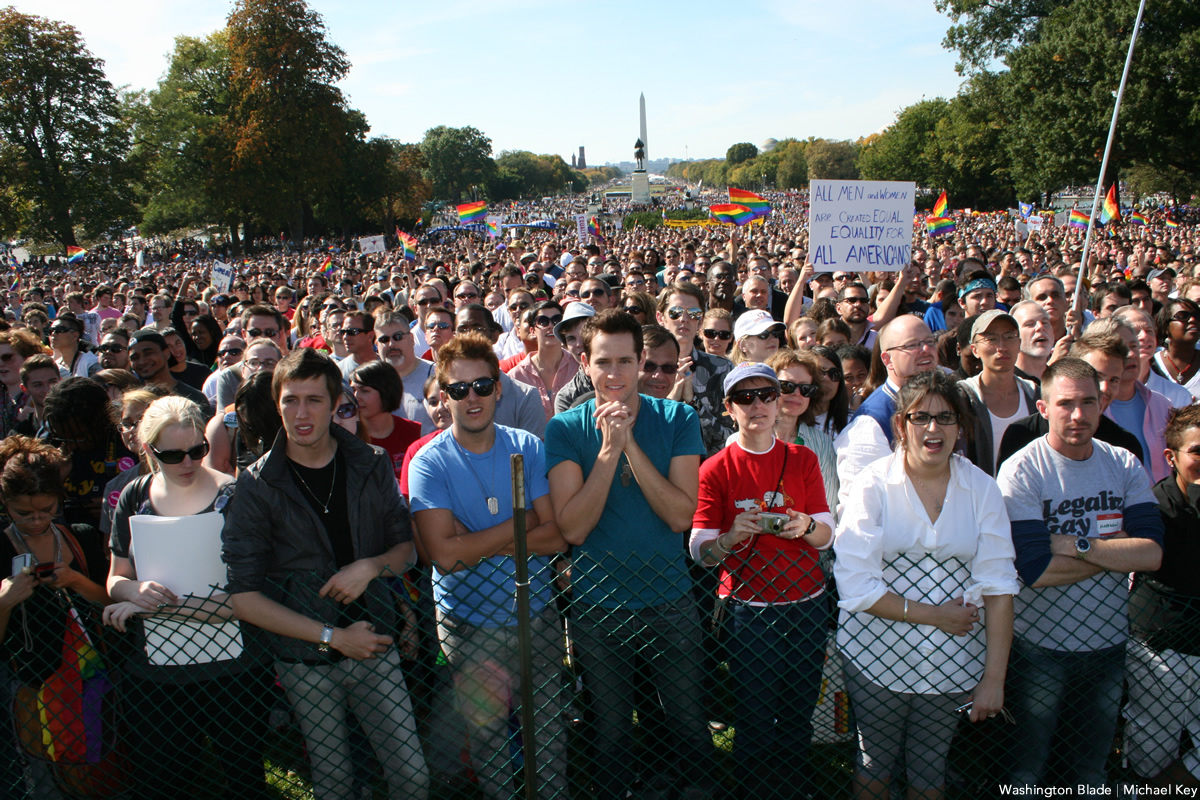
Less than two weeks before the first events of WorldPride 2025 in D.C. are scheduled to begin on May 17, the U.S. National Park Service has yet to officially approve the permits needed for what organizers say will be a small number of WorldPride events scheduled to take place on the National Mall and other federal park grounds.
In response to a request by the Washington Blade for information on the status of the permit applications, National Park Service Spokesperson Brian Hall said in a May 2 email only that at least one of the permits “is still being worked on and not final.”
Hall sent the Blade a chart showing what appeared to be five WorldPride events under consideration for a permit, with four of them set to take place on federal park grounds at or near the Lincoln Memorial.
Ashley Smith, president of Capital Pride Alliance, the nonprofit D.C. LGBTQ organization playing the lead role in organizing WorldPride 2025, said most of the several dozen WorldPride events expected to take place between May 17 and June 8 would be held at locations other than the National Mall and other federal spaces.
“There is really only a small number that we’re doing this with the National Park Service, because we’re not on a lot of federal land for everything,” he told the Blade. “But we have been in communication with them, and our team is consistently communicating with them,” Smith said.
Smith added, “We feel strongly that we will be able to move forward. I don’t believe there are major concerns with us not being able to move forward. We’re making sure we’re providing all the proper information we need to be successful.”
Some LGBTQ activists have expressed concern that the Trump administration, which has put in place policies hostile to the LGBTQ community, especially the trans community, might attempt to block the permits. But another National Park Service spokesperson said in a statement that the permit approval process does not take into consideration the political message of those applying for permits.
“Applications are approved provided no applications were previously submitted for the same dates and locations, and the organizers are able to ensure the preservation of park resources and the safety of all participants, park visitors, and community members,” according to NPS spokesperson Michael Litterst.
“It is a deliberate process that does not consider the content of the message presented,” Litterst added in a statement to the Blade last November after Trump’s election as president.
Sahand Miraminy, the Capital Pride Alliance director of operations, told the Blade in a statement that it is “customary” for the National Park Service to hold off on issuing a permit until about one week before an event is scheduled to begin.
“Oftentimes, this is also tied to the agency’s cost estimates for cleanup, turf restoration, and law enforcement reimbursements,” Miraminy said. “Typically, the National Park Service also has a policy of not sharing detailed event plans for applicants, and we certainly appreciate keeping our detailed event information secure, as it often pertains to the health and safety of our participants,” he said.
“We don’t believe it’s necessary to share with the broad public the exact permits we hold for our events as some reservations are tied to infrastructure and security measures,” Miraminy said, adding that the Capital Pride website is a “great resource” finding the numerous WorldPride events.
The website shows at least one leading event will take place on the National Mall: A June 8 International Rally and March for Freedom will begin on the steps of the Lincoln Memorial and travel from there to near the U.S. Capitol Building, the website states. It says participants in the march will then join the WorldPride Festival and Concert on Pennsylvania Avenue, N.W. near the Capitol scheduled to take place June 7-8.
Vincent Slatt, an official with D.C.’s Rainbow History Project, is among the lead organizers of that organization’s WorldPride exhibition called “Pickets, Protests and Parades: The History of Gay Pride in Washington, D.C.” The exhibition, scheduled for May 17 through July 7, will be held in Freedom Plaza, the federal parklands site on Pennsylvania Avenue, N.W., between 13th and 14th streets.
Slatt points out that Rainbow History Project has applied for its own National Park Service permit for the exhibition and, like Capital Pride Alliance, is still waiting for the permit’s approval.
“I can share great news,” Slatt said in a May 4 message to the Blade, “Rainbow History Project had our latest meeting with NPS this morning and she stated that we are on track to receive our permit. There are no problems expected.”
Slatt added, “As of this morning, our permit is only pending the finalized copy of our insurance and safety plan. These are things my board will vote to approve at our May meeting. Everything looks GREAT for RHP and our activity.”
-
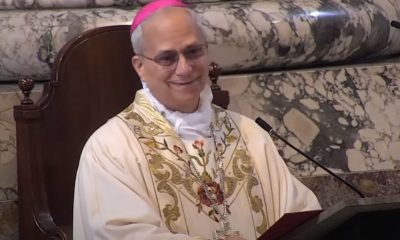
 The Vatican14 hours ago
The Vatican14 hours agoAmerican cardinal chosen as next pope
-
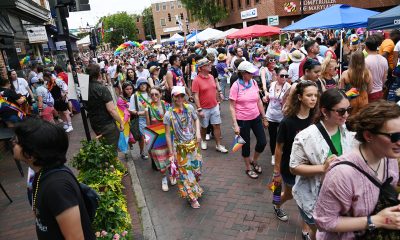
 a&e features21 hours ago
a&e features21 hours agoYour guide to the many Pride celebrations in D.C. region
-

 U.S. Supreme Court3 days ago
U.S. Supreme Court3 days agoSupreme Court allows Trump admin to enforce trans military ban
-
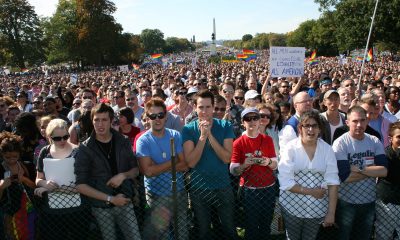
 District of Columbia2 days ago
District of Columbia2 days agoWorldPride permits for National Mall have yet to be approved



